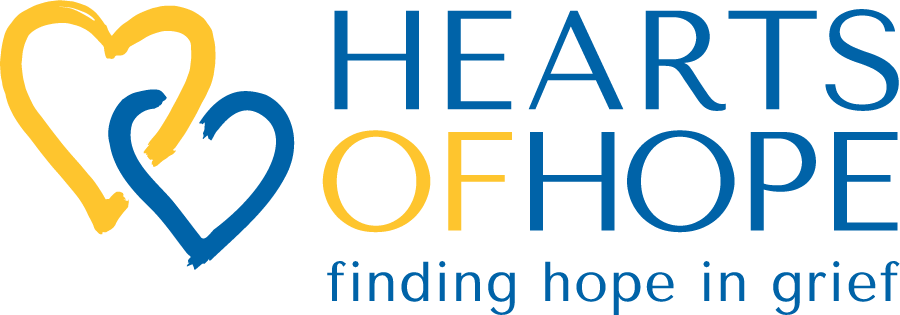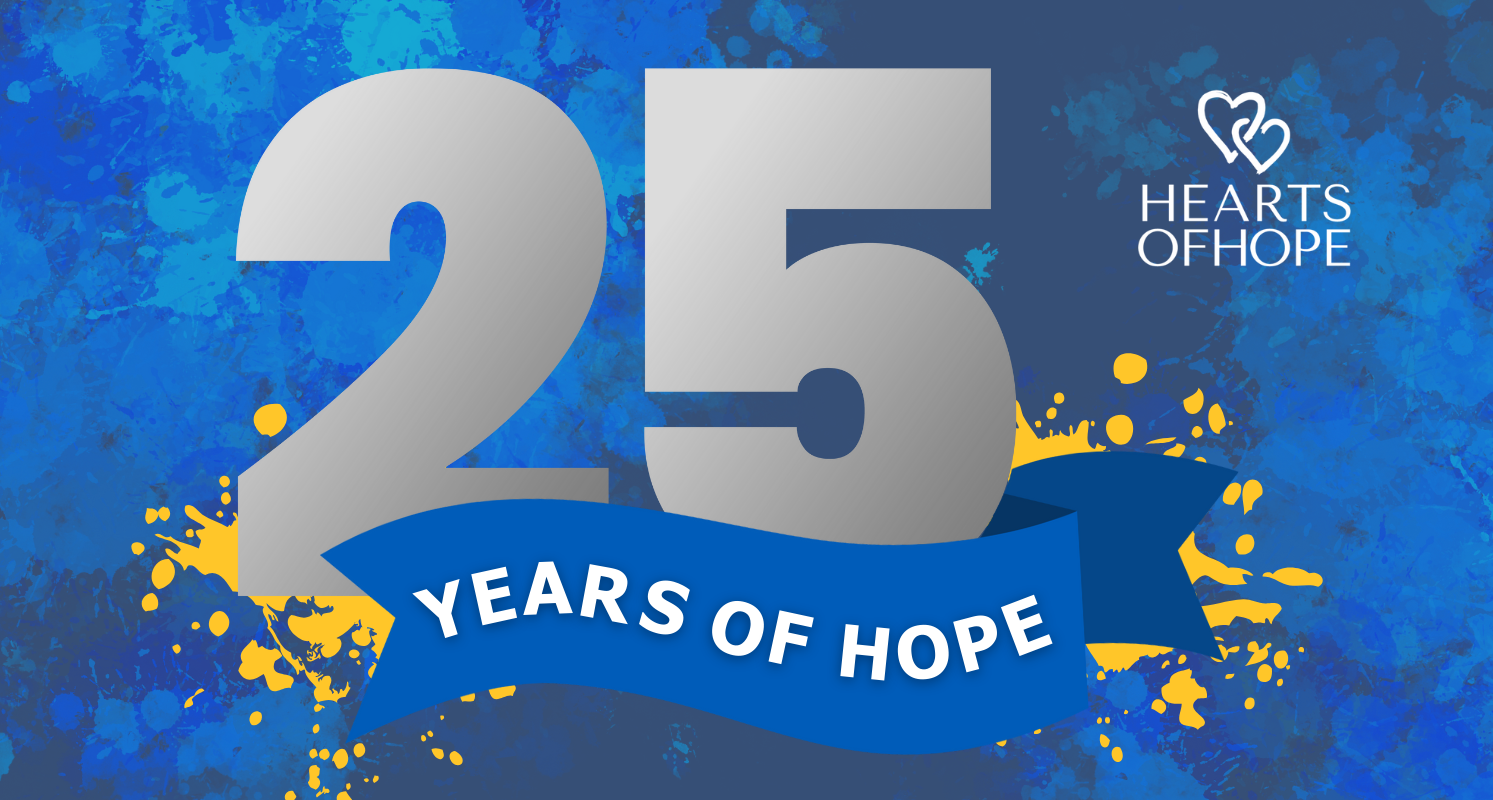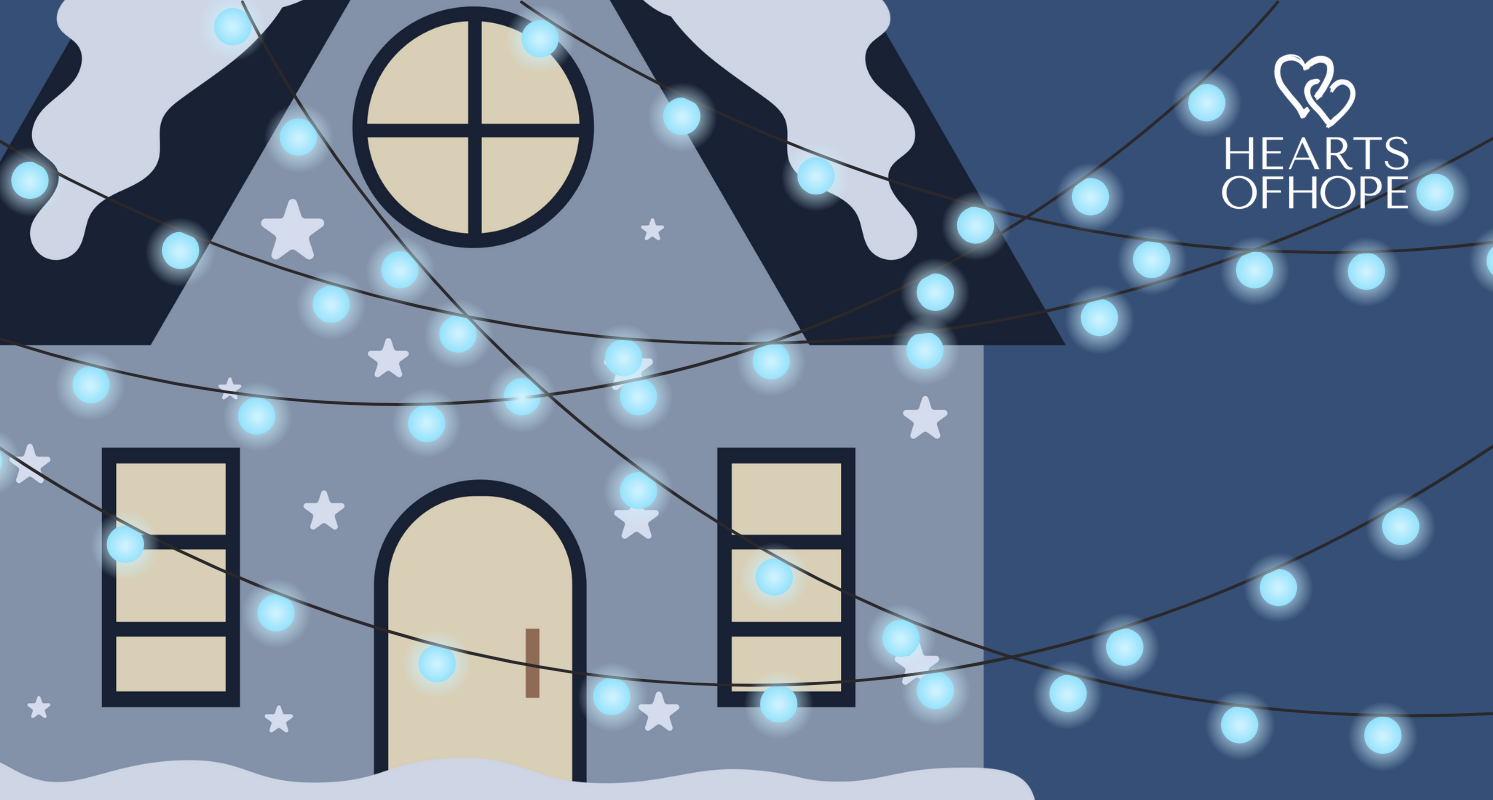Occupational Grief: Perspectives Across Professions

Thoughts from a Massage Therapist on Grief and the Power of Touch
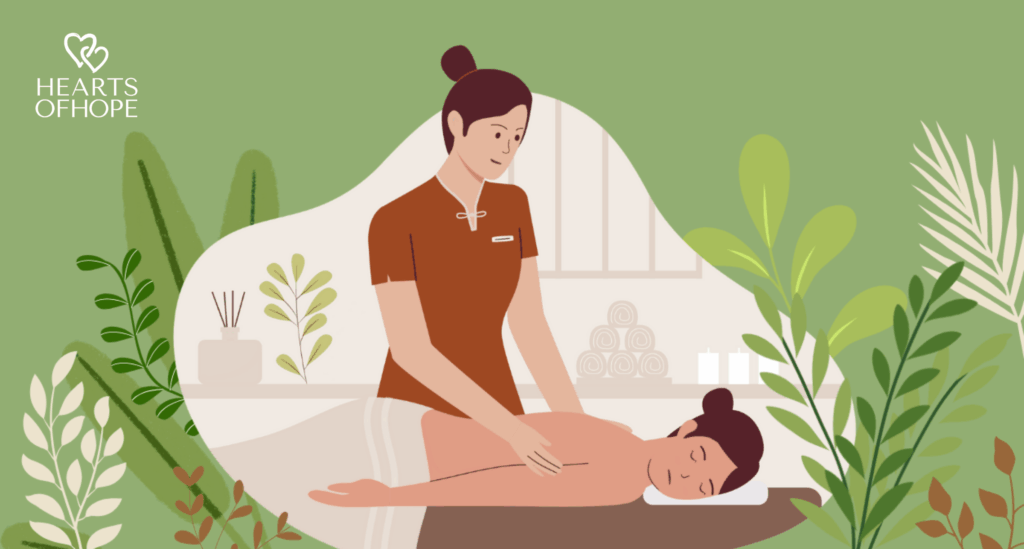
At the Heart of It
• Emotional stress like grief or overwhelm can manifest itself as physical symptoms.
• Those symptoms can create more stress and lead to something called the “Pain-Stress-Pain” cycle.
• Working through physical pain with a professional can help create the space needed to process our emotional stress and break the cycle.
I didn’t expect to cry. It was just a CT scan. But as I lay on the table and the machine began to hum, months of questions and anxieties seemed to bubble up from nowhere. The ceiling tiles blurred above me as tears began to roll back into my hair, my chest tightening with a fear that had nothing to do with radiation or results. I wasn’t just afraid of what they might find. I was afraid of everything: the what-ifs, the not-yets, and the possibility of this being only the beginning of a long, hard road of unknowns.
That was when my nurse—who I’d met about three minutes prior—saw me struggling. She paused beside the machine, took my hand in her gloved one, and gave it the gentlest squeeze. “I’m going to hold your hand as long as I can,” she said.
It’s been a while since that day, but I’ve never forgotten the feeling of her hand in mine. She didn’t try to fix anything. She didn’t offer hollow reassurances. She just stayed, steady and present, anchoring me when I felt like I might float away. That small moment of connection—person-to-person—was a lifeline. I left that facility still afraid, still uncertain, but no longer alone.
It’s something I’ve thought about often, especially in recent months as I’ve learned more about the quiet power of therapeutic touch—not the hurried pat on the back or the obligatory hug, but the kind of intentional, professional touch that invites healing where words have failed. Touch that listens. Touch that makes space for our pain to go where it needs to go.
That’s what brought me to this conversation.
In this interview, I sit down with Roni, a massage therapist whose work has gone far beyond muscle knots and tension relief. During her career, she helped many of her clients navigate emotional pain through body work—grief, trauma, anxiety, even the long echoes of loss that we carry without realizing it. She has worked with people whose sorrow lives in their shoulders, their stomachs, the curve of their spine. People who have cried through sessions not because of pain, but because someone finally touched them in a way that said, “You are safe here.”
We also talk about the connection between the physical body and emotional stress, and how grief can create a cycle of pain that can be easy to slip into and difficult to get out of.
This is not a conversation about luxury spa days or scented oils, though those can have their place. It’s a conversation about the fundamental human need to be held. To be gently reminded that we are still here, still worthy, and still capable of healing.
Whether you’ve experienced loss recently or you’re carrying something unspoken from long ago, I hope my conversation with Roni meets you like that nurse met me—without fanfare or solutions, but with presence and quiet kindness.
Read our interview with Roni below:
HoH: Hi, Roni. Thank you so much for speaking with me today. Just to start out, what was it like to be a massage therapist? How did your work impact your view of the connection between the body and the various struggles we face in life?
Roni: There are two kinds of people who get massage: those who just lay there and take it in – that’s me – and people who turn it into a therapeutic session. You know, “Here’s my life. Here’s all my problems.” And it turned out I was pretty good at that second one. I had people come in who – well, for a lot of the people who came to me, I was the only touch they ever got.
HoH: That sounds pretty powerful.
Roni: I’m not sure that people really understand how powerful touch is, and what it can do. I had a man who came in once a week until the day I retired, and he was a widower and a real pain, but I know that he was never getting touched, ever. And so, for a lot of my clients, they were just bone-crunchingly lonely.
HoH: And you feel like touch helped them feel more connected? How do you think touch can impact people who are experiencing grief?
Roni: I had a client who couldn’t get pregnant. I worked on her, did a little Reiki. I told her, the next time they tried, to picture herself as a fertile garden. She came back pregnant and said, “You did this!” I said, “No, no I didn’t.” But she was grieving being infertile. And suddenly, just with the power of suggestion and the body work, she was able to relax and to let it happen. And I believe it was her change in mindset, because people who are trying to get pregnant are just nervous wrecks the whole time. And when she finally relaxed, they were able to conceive. And you know, that was grief right there that was helped by body work.
HoH: From your perspective, how does emotional trauma turn into physical symptoms?
Roni: You know, think about it. When you were in school and exams were coming up, did you ever vomit? Did you ever get a migraine? Did you ever get a panic attack? There is always a correlation between the psychological and the physical. It comes out in one way or another.
I’ve seen people break out in rashes over stress. Years ago, I knew somebody who had a frozen shoulder. She hadn’t injured herself. She was under a lot of stress. She was holding her shoulders up toward her ears and forward. And without really addressing what it was she was stressed about, we just worked together on the shoulder.
HoH: So she didn’t have to completely resolve her stress in order to resolve her physical situation.
Roni: No, but I also knew that releasing the shoulder would give her healing. She got confidence because she had started a new job. She had been allowing this situation to interfere with her marriage, and that kind of worked itself out. And it was just because she felt safe enough to love somebody.
HoH: Do you feel like those physical symptoms can then create a feedback loop and cause or escalate emotional situations as well?
Roni: Yes. There’s something called the “Pain-Stress-Pain Cycle,” which is about people who are in chronic pain. Pain causes stress, stress releases the wrong endorphins, which increases the pain, etc.
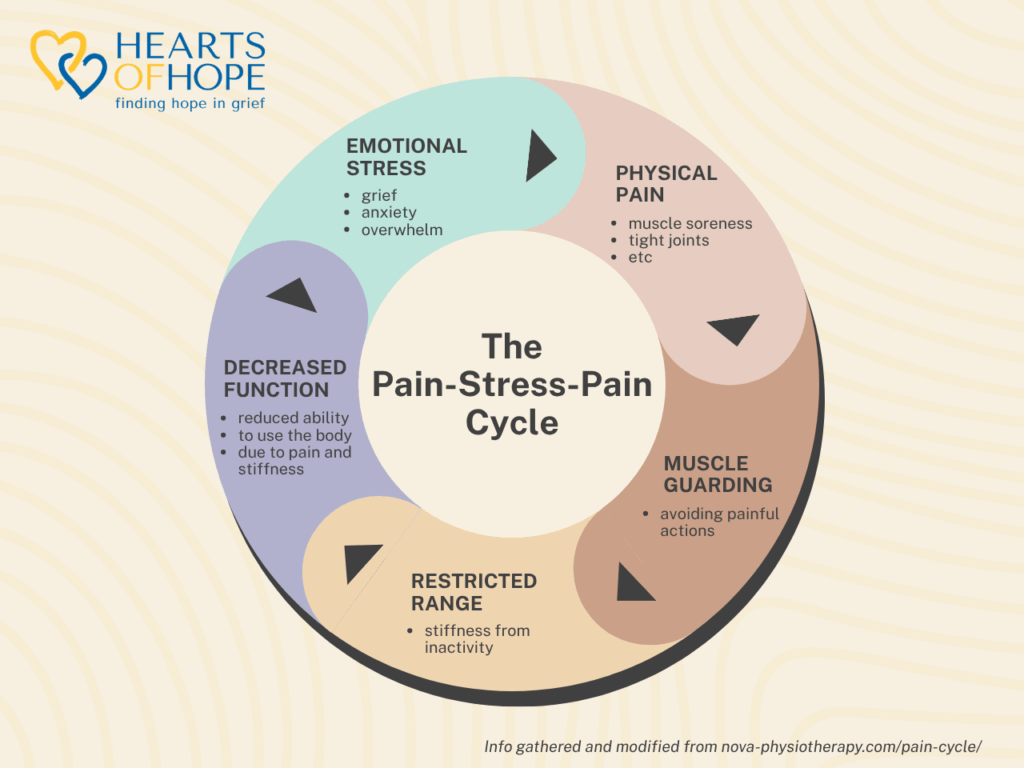
And body work is just aces for that, for breaking that kind of cycle. I’m not somebody who overtly says, “Hey, let’s talk about grief.” But it always comes up in one way or the other. Really, almost everyone I saw had a story.
I had a client once who kept making an appointment, then breaking it, then making it. And I said, you know, “When you’re ready, I’m here.” And she finally came in. I had my hands on her for 30 seconds and she just burst into tears. She was afraid of touch, because she had been assaulted as a child. She was doing this to help her regain her sense of touch. And I didn’t do anything specific except try and read her body, where I should or shouldn’t go. And after we had been working together for a while without asking if she wanted to talk about it, we did. And she did. But, by the end, she was getting a full body massage with no hesitation. I just let her become comfortable with her body and release the trauma.
HoH: Did you ever encounter anyone who was injured and needed to work through the grief of that kind of change?
Roni: Oh, yeah. I had a client who was an orthopedic surgeon and an avid basketball player. And he fell and tore his Achilles tendon, and was so mad. He came in right after the surgery. He was on crutches, and we ended up working on his foot, but he still never did play basketball again, and he never quite got over that. I never really thought of it as grief. But now that you just said those words, I guess it was.
A few of my patients did die, and a couple of them I was lucky enough to be able to go to the hospital and massage them in their last days, their feet and their legs. And that was nice, and helpful, I think.
HoH: So you did end-of-life massage? Was that difficult, emotionally, for you? Because you knew these clients, right?
Roni: Yes, but it wasn’t, for a few reasons. In the past, I was a hospital chaplain, and my main reason for being that was to help people die. So it was not something that was new to me. I think I was able to help people maintain some comfort in that whole process. And it didn’t really affect me, except that I was sad to lose clients. But I was happy to provide a service.
HoH: What a special way to interact with someone via touch. Okay, final question: What were your priorities during those kinds of sessions? Did it change client-to-client, or was there a similar approach you took to every end-of-life patient?
Roni: It was what the client wanted or needed. When you touch someone, you become very perceptive to their needs, if you’re open to that. So, I just knew what they wanted, and sometimes they would say it, but a lot of them just wanted to talk about their fear and their anxiety. And I just gave them that space.
And that space made all the difference.
Thank you so very much to Roni for her time and all the care she has put into her work over the years. It’s clear that having a safe space is essential to allow for true healing, something Roni understood and provided with excellence during her career. If you enjoyed this interview, you can find our other Occupational Grief blog posts here.
Pause for a Beat
• Sometimes, like the woman with the frozen shoulder, stress can become physical without our realizing it. Has this happened to you?
• Have you ever found relief from emotional pain through physical massage or other activities?
• Research shows that having a space to process trauma can expedite recovery. We are always open to hearing your story and providing a safe environment for healing.
Hope and Healing Toolbox
- How to tell when what you’re feeling is grief
- This article by Nova Physiotherapy outlines the stages of the Pain-Stress-Pain Cycle
- Healing goes beyond the physical – read our blog about practicing hope
